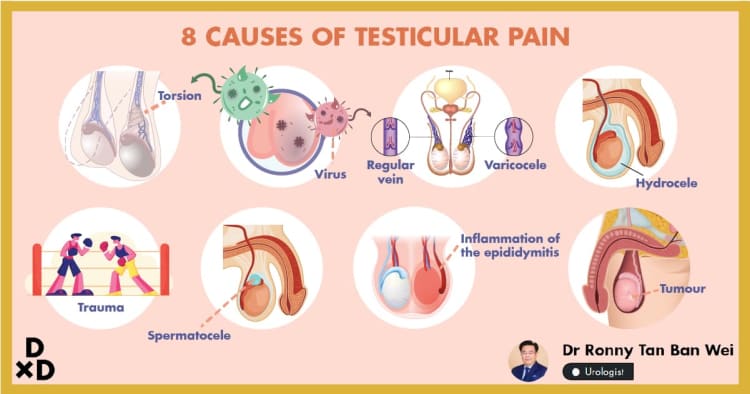Trying for a baby but just can't seem to work? Join us in our webinar as we explore the TCM perspective on male infertility and erectile dysfunction.
Title: Consult a TCM Physician: Male Infertility and Erectile Dysfunction
Date: 9 April 2021
Time: 6pm
Register here: https://bit.ly/3sEcyPP
When a man consistently fails to impregnate a fertile woman, he may be suffering from what is known as male infertility.
40% to 50% of all cases of infertility are due to male infertility, and about 7% of men all over the world suffer from it. There are various reasons for male infertility, which I will share in this article.
Male infertility is on the rise
Male infertility is on the rise, not just in Singapore but worldwide! In Singapore, the number of patients seeking treatment at male fertility facilities has risen. From 2015 to 2018, it rose by as high as 80%.
Male infertility in Singapore seems to coincide with the decline of sperm quality worldwide. According to the 1999 World Health Organisation (WHO), semen normally contains at least 20 million sperm cells per millilitre. At least half of them are motile and capable of fertilising an egg.
In a 2010 publication, the average human semen was found in a study to contain at least 15 million sperm per millilitre [1], and the number of motile sperms has dropped to 40% of the total count.
What causes male infertility?

1. Obesity
Obesity is linked to a lower sperm count, as well as poorer sperm quality.
Infertility can be caused by [2]:
- disrupted sleep patterns
- altered sexual behaviour
- hormonal imbalance
- high scrotum temperature
- other semen parameters
2. Intense physical exertion
Studies have shown that recreational exercise can have either a positive effect or no effect on semen quality.
However, intense exercise can have a bad effect on semen. This is because sperm are sensitive to heat! The testes' ability to produce healthy sperm can be affected by heat.
Often, this happens when the scrotum is exposed to high heat when the body's temperature increases. This can be due to intense physical exertions such as:
- cycling
- motorsports
- horse riding
However, this should not be an excuse for one to stop exercising!
3. Increased temperature of your surroundings
As mentioned above, heat can alter the production of sperm [3]. Thus, prolonged time in a hot place can induce heat stress on the testes.
A sauna or hot tub may feel nice and cosy to you, but your sperm cells may feel otherwise!
4. Performance-enhancing supplements
Performance-enhancing medication and supplements can reduce the production of sperm. This includes anabolic steroids and androgens.
But do not fret! There is good news! Your sperm production can be returned to its original healthy level. However, you have to stop taking the supplements. The effect will take place after a few months.
5. Substance use and abuse
In both men and women, fertility can be reduced with the use of:
- tobacco
- other tobacco-based products
- marijuana
- alcohol
- illicit drugs
Using tobacco products decreases the overall sperm count in males. It also has an adverse effect on sperm motility [4].
Marijuana not only leads to a reduced sperm count, but abnormalities can also occur in the sperm.
6. Medical treatments
Radiation therapy and chemotherapy are some treatments that can lead to infertility [5]. This can happen in both men and women.
The high-energy pulse that kills cancer cells can kill healthy cells as well. When aimed directly at the groin area, fertility can be affected. At high doses, radiation can kill the stem cells in charge of sperm production.
Radiation therapy to the brain can also cause infertility, as the treatment can disrupt the hormones that signal to the testes to produce sperm.
Chemotherapy kills cells that divide quickly, and sperm cells are sadly one of these cells. Patients undergoing chemo may face temporal infertility during the treatment. They may suffer from it permanently if all the cells in the testes are damaged to a large extent.
7. Other health problems
Some existing health issues that can have an impact on your sperm production are:
- undescended testicles
- certain genetic factors
- diabetes
- sexually transmitted diseases like HIV, gonorrhoea and chlamydia
Varicocele is an abnormally enlarged vein in the testes that may affect sperm count. However, more research is needed to learn more about its effects.
Other causes of male infertility can also include conditions like:
- cystic fibrosis
- blockages in the sperm duct
- damage to the reproductive organs
What are the treatments for male infertility?

Before diagnosing your condition and prescribing treatment, specialised urologists will conduct some tests. These include [6]:
- a general physical examination
- semen analysis
- scrotal ultrasound
- biopsy of the testes
- genetic and hormone tests
- post-ejaculation urine analysis
- sperm test
- transrectal ultrasound
There are no treatments that can improve a man’s sperm quality. However, you can increase the chances of conception using your existing sperm quality [7].
Surgery
Surgery can fix or repair:
- anatomic abnormalities
- any damage to the reproductive organs
Varicocele causes the tubes that carry the sperm to be blocked. This may be due to an injury or vasectomy. These blockages can be removed and the tubes can be repaired [8].
When no sperm are present in the ejaculate, they can be retrieved directly from the testicles or epididymis with the use of sperm retrieval techniques.
Antibiotic treatments
When the reproductive tract gets infected, it may lead to male infertility. A course of antibiotics will help cure the infection. However, it does not help restore fertility.
Hormonal treatments
Gonadotropins are hormones that trigger the testicles to produce sperm. They is released from the pituitary gland in your brain.
In some cases, your doctor might suggest hormone replacement or medication to help boost sperm production [9].
Artificial insemination
The most common form of artificial insemination is intrauterine insemination (IUI).
To collect semen, the man will have to ejaculate. The sperm with the best quality are picked and prepared in the lab. They will then be inserted directly into the woman’s uterus through a catheter. Frozen sperm samples can also be used.
This process is usually done during natural or simulated ovulation. Simulated ovulation, also known as superovulation, refers to the practice where medication is given to help with ovulation [10].
Assisted reproductive technology (ART)
ART includes all fertility treatments where both the egg and sperm are handled in the lab, outside of the body. The sperms can be obtained via:
- normal ejaculation
- surgical extraction
- donors
During ovulation, the woman's eggs are released from her ovaries. Under ultrasound control, we can collect the eggs through the vagina.
After collection, an egg will be mixed with the sperm. They will then be placed into a special incubator. An embryo will develop and then be implanted into the uterus [11]. To plant the embryo, a thin tube is passed through the cervix.
The more widely used method of ART is In vitro fertilisation (IVF), where the sperm naturally penetrates the eggs. They will then be placed in a special lab incubator where they may develop. The embryo chosen will be the best out of the rest. It will then be transferred into the womb.
If IVF fails, the next alternative ART is Intra-cytoplasmic sperm injection (ICSI). It is performed as a part of IVF, and is recommended when you have:
- very low sperm count
- sperm which are unable to move properly
- sperm that have a high rate of abnormality, such as in their shape
- had IVF before but it failed to conceive
- a need to collect sperms surgically from the testicles or epididymis
- frozen sperm
- high levels of antibodies in semen
With ICSI, a single sperm cell is chosen. To collect it, the doctor will have to use a glass needle, and inject the sperm directly into each egg. In the same way as IVF, the embryo will be transferred into the womb.
IVF and ICSI are very similar. However, there is one main difference between the two. For ICSI, each sperm cell is single-handedly injected into the egg. For IVF, the sperm will naturally penetrate the egg.
Conclusion
Male infertility is an ever-increasing problem found in men over the last few years. But if you are suffering from male infertility, there are many ways you can improve the chances of getting a new addition to your family.
The treatments listed above are some of the options you may consider. Do not give up!
%treatmentquote title=Get quote for Male Infertility Treatments%
Dr Lee Fang Jann was appointed to the Ministry of Health’s advisory committee on transplantation and he is the current vice-president of the Asian Andrology Association. He has also pursued advanced laparoscopic and robotic training in the United States, France and India.
Would you like to ask any related health questions?
You can Ask A Doctor right away, or request for treatment quotes from doctors.










